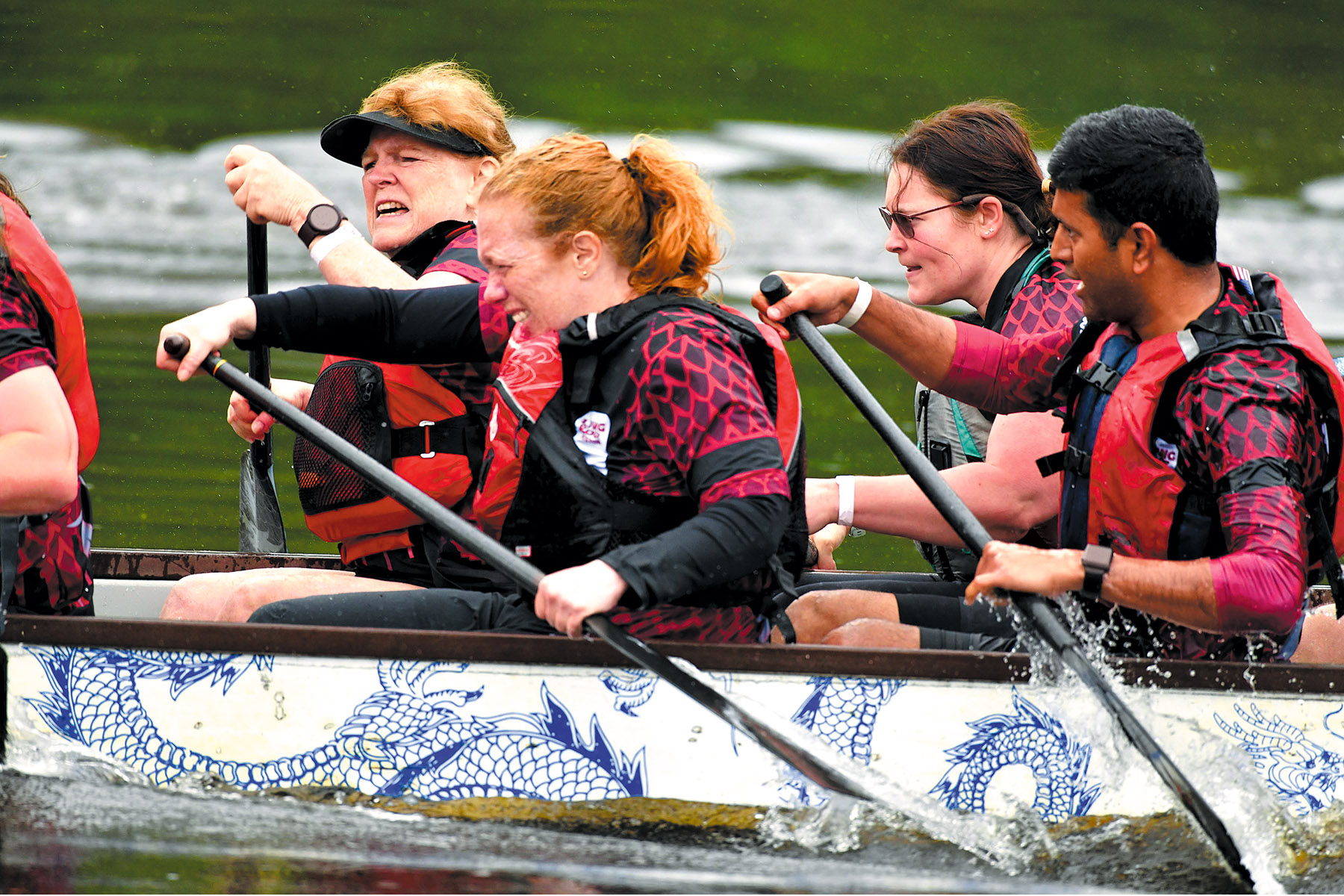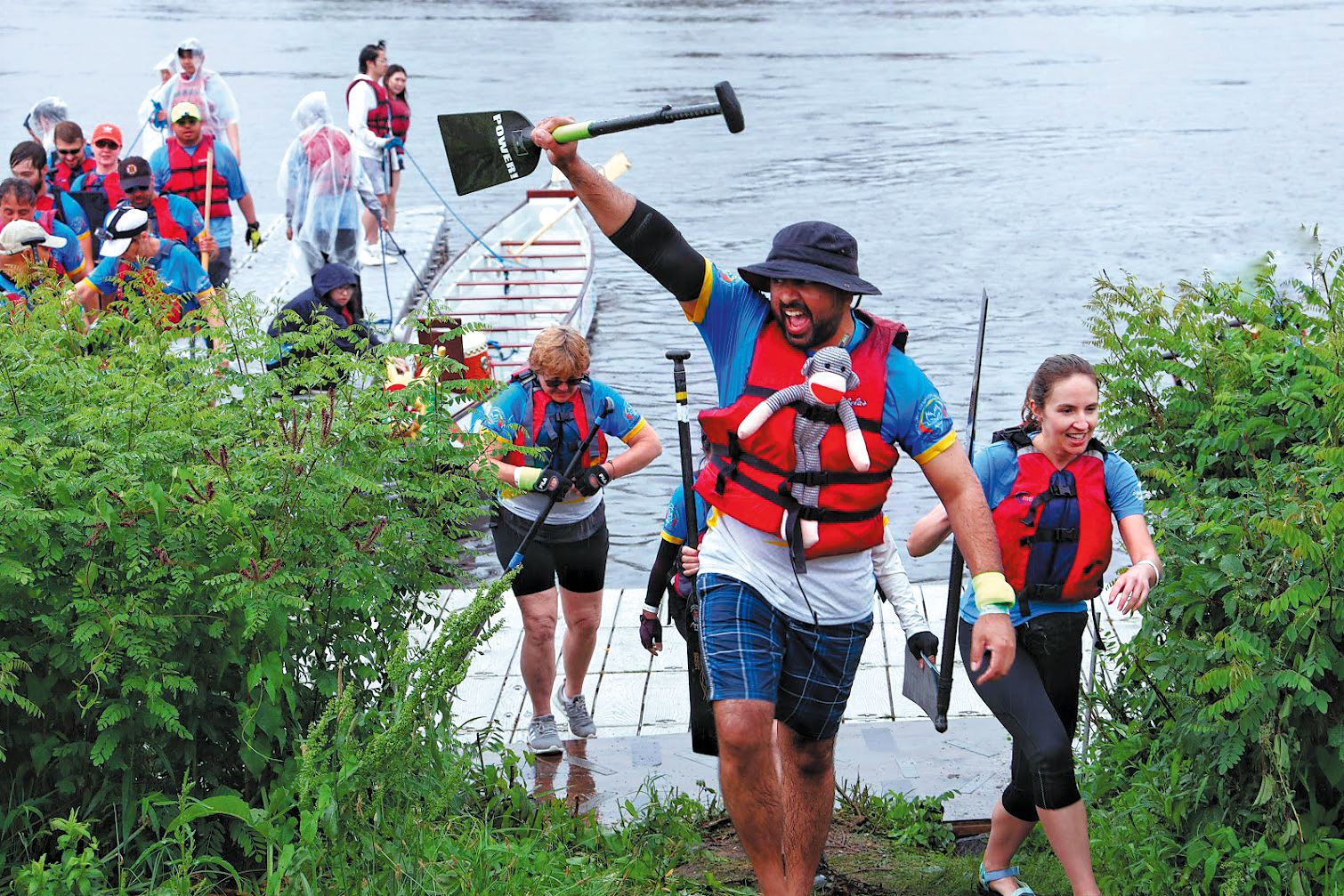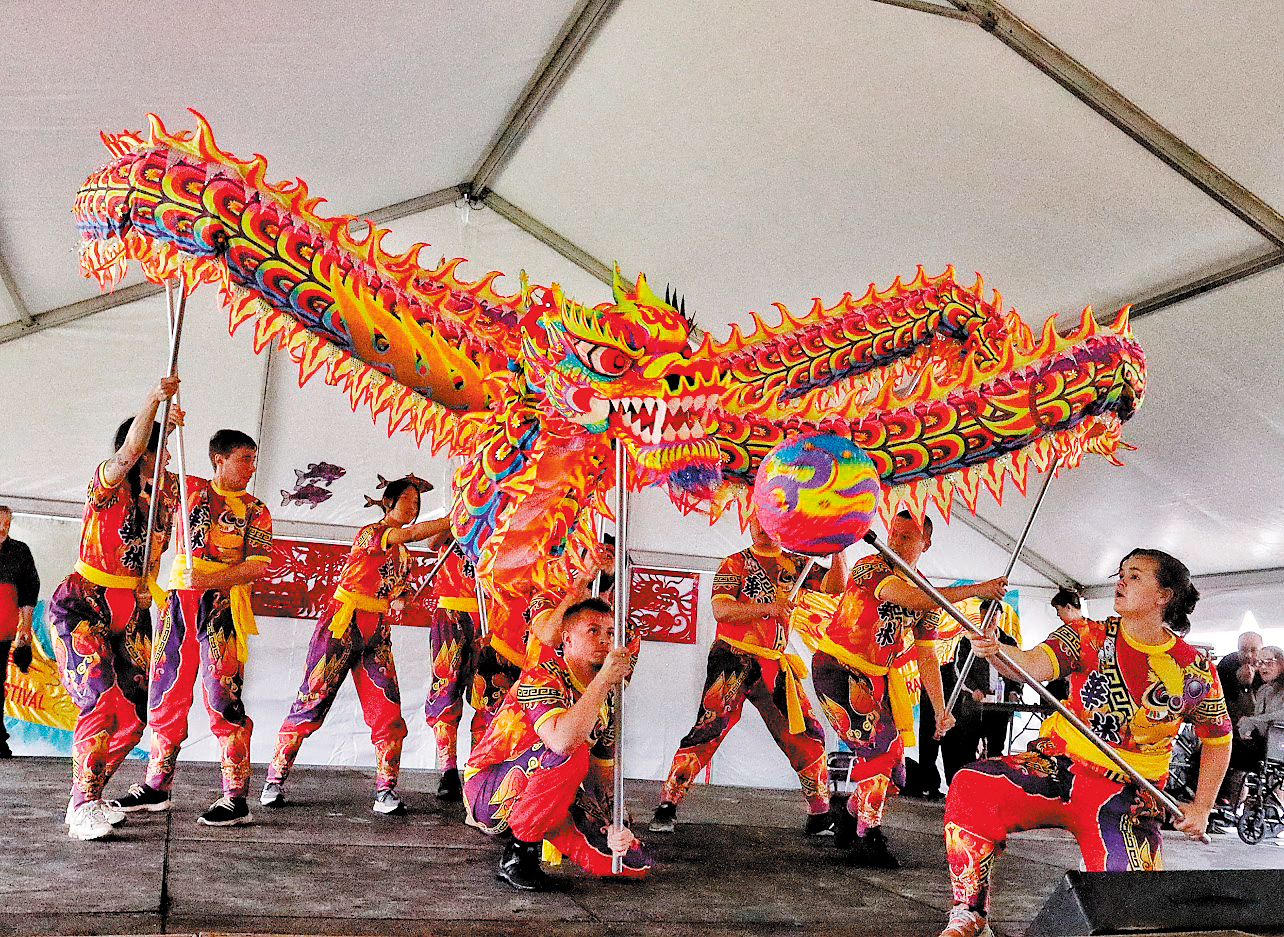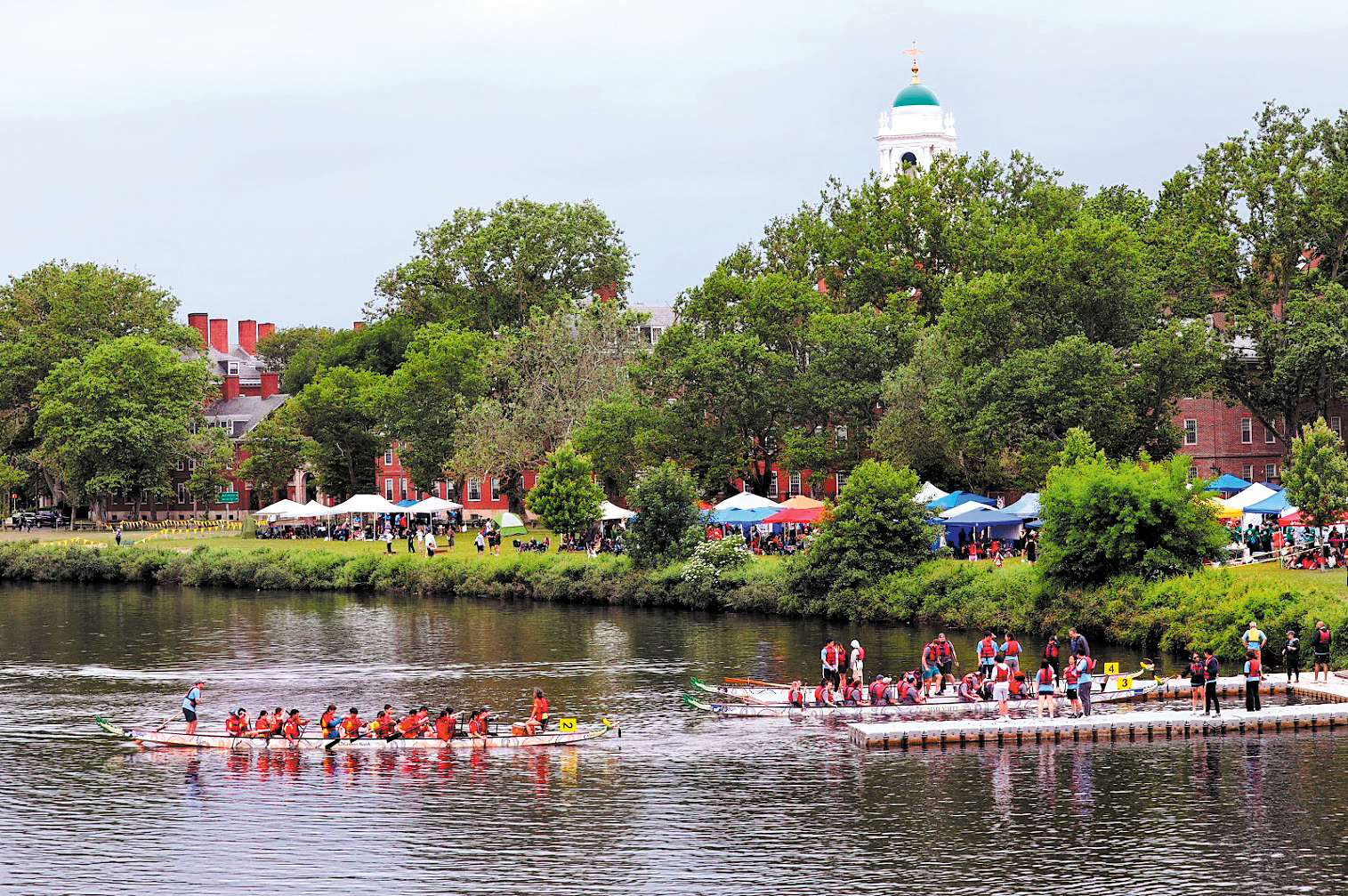Participants battle it out on the river, celebrate the festival’s history and traditions

On the Charles River over the weekend, thousands of people enthusiastically participated in dragon boat races, with a cultural fair on land celebrating the traditional Chinese festival.
Known as the first and oldest event in the United States celebrating the Dragon Boat Festival, the Boston Hong Kong Dragon Boat Festival was held on June 9 and featured 68 teams with about 2,000 participants from New York and the New England states.
“We want to promote dragon boat racing. We want to use this platform to promote Asian culture … people come here to learn, for exchange or just for fun, too,” Gail Wang, president of the Boston Hong Kong Dragon Boat Festival’s board, told China Daily.
Wang said dozens of volunteers for the 45th annual festival had been working diligently over the past year to preserve the tradition, while also offering a fresh perspective to attendees.
“It’s very important for (connections) of people … culture exchanges, and that’s what we do,” she said.
The festival, also called Duanwu, is a traditional Chinese festival observed on the fifth day of the fifth lunar month. It commemorates the life and death of Qu Yuan, a poet and politician during the Warring States Period (475-221 BC). Upon hearing that his state, Chu, had fallen, he committed suicide by drowning in the Miluo River.
Legend says that the people of Chu rushed to the river to rescue him, but they were too late. So they threw zongzi, or traditional rice dumplings wrapped in bamboo leaves, into the river to keep the fish away from eating his body.
Today, zongzi and dragon boat racing have remained traditions for Chinese people.
The historical significance, combined with fun, competitiveness and athleticism of racing, has transformed dragon boat racing into a sport that attracts participants from around the world. It also serves as a gateway for people to learn more about Chinese history and culture.
“I love to come to the Dragon Boat Festival. I think it’s one of the best things that happens in Cambridge, and we’re so delighted to welcome all of the rowers and everyone to Cambridge,” said Jason Weeks, executive director of the Cambridge Art Council.

Weeks said the shape and design of the dragon boats are part of Chinese culture and art. “The arts and culture always create the opportunity for us to come together successfully and in a spirit of celebration,” he said.
“No matter what the politics of the day or the difficulties or challenges we might face as a country or an area, I think the arts always bring us together and create social cohesion.
“And the festival is one of the biggest and best ways to bring all of the different communities of Cambridge together to celebrate the Chinese culture and history.”
Roger Jones also enjoys dragon boat racing and the spirit behind it. He is the author of The Final Victory, a novel on the thrills and challenges of dragon boat racing.
“In 2005, I was diagnosed with a rare form of cancer, and a couple of years later, I started paddling with a dragon boat club in Charleston, South Carolina,” Jones said.
“In 2010, we decided that we wanted to put an all-cancer team together to see if we could compete at the national championship level.”
Jones said he really did not think they had much of a chance to win, but they won the national championship.
“It was a great honor, and we earned the right to represent our division in Hong Kong the next year,” he said, but the team was not able to go because some people were ill, and several died the next year.
“The book is a novel based on this team and what we did, what we accomplished, and just the inspiration that it brought to a lot of people, and the hope that it brought to people not quitting, giving up and moving forward and achieving something they didn’t think they could ever achieve,” he said.
Jones said he has also been involved with the dragon boat community and has learned more about Chinese culture.
“It’s a wonderful, beautiful culture. I think the beauty of it is 20 people working in unison — that’s the teamwork,” he said.

Dragon boat racing is now also a popular recreational sport.
“I’m really enjoying it. It’s my first festival. It’s my first dragon boat race, and it’s been an incredible experience,” John Micale, a member of the Boston 1 Team, said.
“Part of the reason I’m enjoying it is because of the diversity, cultural diversity of participating. The more we can bring people together from different backgrounds, different countries, the better place this world will be.”
Hilary Nicholson, 34, of Team Tango, representing Tango Therapeutics, said this was the first time that her team had participated in the race.
“We’ve never done it before, so it’s been a really fun experience, just learning how to do it, learning all the differences,” she said.
“I think I was intimidated doing this as a first-timer, and everyone has just been so incredibly welcoming, incredibly supportive. Even if you’ve never done it and you are brand new, come give it a try.”
Along the Charles River where Harvard University is located, students also expressed their interest in dragon boat racing at their “home river”.
“Well, we’re super tired. We finished our third race, but really happy to be here,” Kassandra Diaz, a 26-year-old Japanese literature graduate student, of the Harvard dragon team, said. The competition started at 7 am and concluded at 5 pm, with heavy rain in the morning.
“The weather cleared up! Most of us are locals, so to be able to get on the Charles where we’ve been doing our practices and actually compete with a lot of our fellow teams has been really amazing,” she said.
“There are 20 paddlers in a boat, as opposed to your regular three to six people in a canoe, so you really have to communicate with each other a lot of times without words. Your body and being able to feel the boat move together as a team … can make all the difference in a race. So that’s a really appealing part of it for us.”

Aric Lu, a 28-year-old bioengineering PhD student, said many people looked forward to the race.
“It’s one of the few times where the entire dragon boat community in Boston comes together,” he said. “It’s always great to paddle, meet new people and have a lot of fun.”
He said dragon boating in particular is “one of those things that brings a lot of people together and kind of bridges some of those gaps that sometimes occur”.
“And it’s also just another opportunity for a lot of people from a lot of different cultures to come together and work together and, you know, participate in something like this,” Lu said.
At the festival, Chinese students and dragon boat alumni teams proudly represent their colleges, while also promoting Chinese traditions and culture.
“We are very proud to represent our school and our region,” Zhang Lida, from the Sun Yat-Sen University team, said. She said dragon boat racing is especially popular and more intense in South China.
“We are so proud of this event, and we invited all of our friends and tell them where the event came from. We told them the history of the tradition,” Wang Yongtao of the Sun Yat-Sen team said.
Cao Yajun, 24, of the Peking University Alumni Association, said the races and cultural events at the festival are good ways of promoting this traditional Chinese culture.
“It’s really exciting, really unites all the people and all the members of the alumni of our university,” he said. “I feel a strong, emotional feeling from the team.”
The PKU alumni team, Dreamega, finished first in its division.
Shirley Shen, from the Tsinghua Alumni Association team, said she has participated in the event for seven years, and said people are passionate about joining the team with school pride and sporting spirit.
The Tsinghua team finished third.
“I’m so very proud. I’m proud to express our culture and our tradition, especially to our younger generation as well,” she said.


